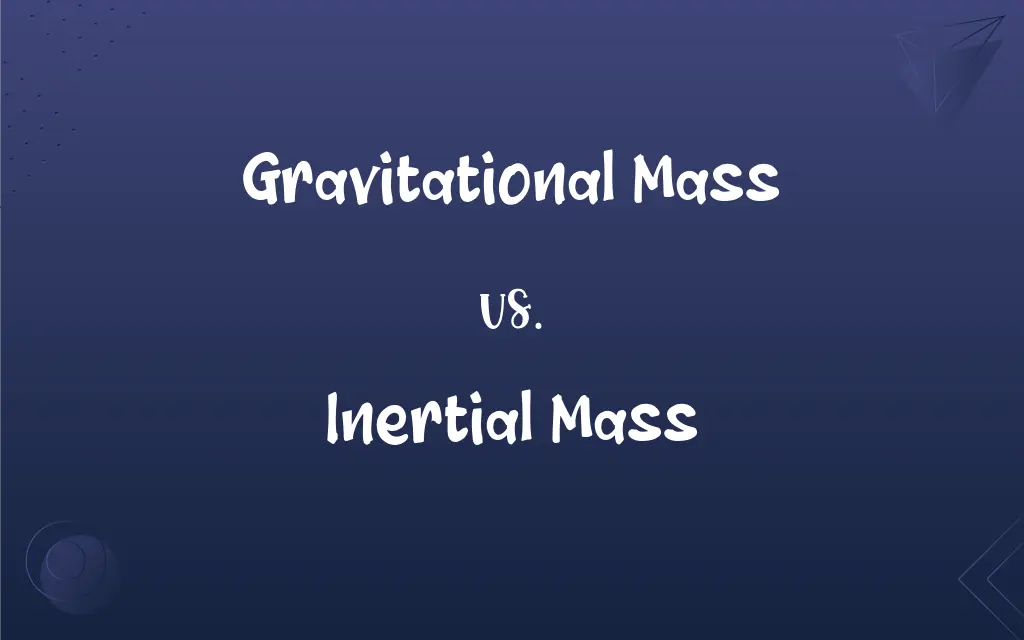Gravitational Mass vs. Inertial Mass: What's the Difference?
Edited by Aimie Carlson || By Janet White || Published on January 5, 2024
Gravitational mass determines the force of gravitational attraction, while inertial mass measures resistance to acceleration under applied force.

Key Differences
Gravitational mass is a measure of how much gravitational pull an object exerts and experiences. Inertial mass, on the other hand, is a measure of an object's resistance to changes in its state of motion when a force is applied.
The force between two objects due to gravity depends on their gravitational mass. In contrast, the extent to which an object accelerates under a given force is determined by its inertial mass.
Gravitational mass is key in calculating the gravitational force in Newton's law of universal gravitation. Inertial mass is central to Newton's second law of motion, defining how force and acceleration are related.
In theory and all experimental evidence so far, gravitational and inertial masses are equivalent – a cornerstone of Einstein's theory of general relativity. However, they are conceptually different: one relates to gravitational interaction, and the other to inertia.
The concept of gravitational mass is integral in understanding orbits and celestial mechanics. Inertial mass is crucial in understanding how objects behave under various forces in everyday physics.
ADVERTISEMENT
Comparison Chart
Definition
Measure of gravitational pull and attraction
Measure of resistance to acceleration
Role in Physics
Central to law of universal gravitation
Central to Newton's second law of motion
Experimental Equivalence
Equivalent to inertial mass in experiments
Equivalent to gravitational mass
Conceptual Focus
Focuses on gravitational interaction
Focuses on inertia and motion resistance
Practical Application
Important in celestial mechanics
Essential in everyday force and motion
ADVERTISEMENT
Gravitational Mass and Inertial Mass Definitions
Gravitational Mass
Crucial for understanding gravitational fields.
Gravitational mass helps explain why objects fall towards the earth.
Inertial Mass
Central to Newton's second law of motion.
Inertial mass determines how a ball moves when kicked.
Gravitational Mass
Key factor in celestial mechanics and orbits.
Astronauts study gravitational mass to understand satellite trajectories.
Inertial Mass
Describes an object's tendency to maintain its state of motion.
Inertial mass is why it's hard to stop a moving train quickly.
Gravitational Mass
Integral in calculating gravitational pull.
Gravitational mass is used to determine the weight of an object on Earth.
Inertial Mass
Indicates how much force is needed to change an object's motion.
Larger inertial mass means more force is required to move an object.
Gravitational Mass
Determines gravitational force between two masses.
The gravitational mass of the sun keeps the planets in their orbits.
Inertial Mass
Fundamental in dynamics and motion studies.
Engineers consider inertial mass when designing machines.
Gravitational Mass
Measure of an object's ability to attract and be attracted by gravity.
Earth's gravitational mass dictates the moon's orbit around it.
Inertial Mass
Measure of an object's resistance to acceleration when a force is applied.
A car's inertial mass affects how quickly it can speed up.
FAQs
What is inertial mass?
It's a measure of how much an object resists acceleration under force.
What is gravitational mass?
It's a measure of how much an object attracts or is attracted by gravity.
Are gravitational and inertial mass always equal?
Yes, in all experiments so far, they have been found to be equivalent.
Why is inertial mass important in physics?
It's crucial for understanding how objects move and respond to forces.
How do you measure gravitational mass?
It’s often measured using the weight of an object, which is a force.
Can inertial mass be zero?
No, all objects with mass have a non-zero inertial mass.
How is gravitational mass used in astronomy?
It's used to calculate gravitational forces and understand celestial orbits.
How do gravitational and inertial mass relate to weight?
Weight is a force that depends on gravitational mass, not inertial mass.
Can gravitational mass change with location?
No, gravitational mass is intrinsic and doesn’t change with location.
Do gravitational and inertial mass depend on the composition of an object?
They are independent of an object's composition.
What role does inertial mass play in car safety?
It determines how quickly a car can accelerate or decelerate, affecting safety.
Does the Earth’s gravitational mass change over time?
Earth's gravitational mass is essentially constant over time.
How is inertial mass measured?
By applying a known force and measuring the acceleration produced.
Is inertial mass involved in rotational motion?
Yes, it affects how an object rotates under an applied torque.
How does inertial mass relate to momentum?
Momentum is a product of inertial mass and velocity.
Do gravitational and inertial mass play a role in space travel?
Yes, understanding both is crucial for navigation and propulsion in space.
Does inertial mass depend on the speed of an object?
No, inertial mass is constant regardless of an object's speed.
How do gravitational and inertial masses relate to Einstein's theory of relativity?
Their equivalence is a cornerstone of general relativity.
Can gravitational mass affect light?
Yes, gravitational mass can bend light due to gravitational fields.
Is gravitational mass relevant in zero gravity?
Yes, gravitational mass is still relevant for gravitational interactions.
About Author
Written by
Janet WhiteJanet White has been an esteemed writer and blogger for Difference Wiki. Holding a Master's degree in Science and Medical Journalism from the prestigious Boston University, she has consistently demonstrated her expertise and passion for her field. When she's not immersed in her work, Janet relishes her time exercising, delving into a good book, and cherishing moments with friends and family.
Edited by
Aimie CarlsonAimie Carlson, holding a master's degree in English literature, is a fervent English language enthusiast. She lends her writing talents to Difference Wiki, a prominent website that specializes in comparisons, offering readers insightful analyses that both captivate and inform.






































































